It is with much gratitude and admiration that we celebrate the jury alumni members of the Core77 Design Awards.
Jury Alumni
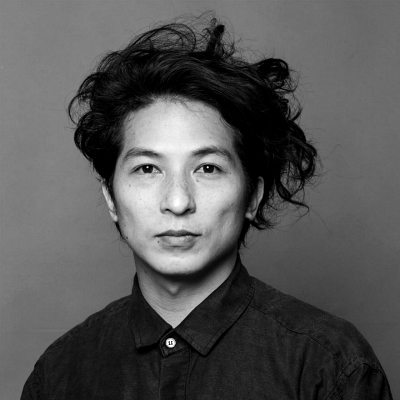
Chuong Pham
Creative Director & Co-founder, Kaarem
2018 Packaging Jury Member
Chuong Pham is the creative director and co-founder of Kaarem, a design and production studio based in Saigon and New York City. Prior to Kaarem, Chuong worked as a mechanical engineer. In 2013, he founded Kaarem with Kathy Minh Bach and launched a women’s line designed and produced entirely in their studio in Saigon. The studio focuses on blending contemporary designs with hand-crafted details.

Kiefer Limeback
CEO, Limeback Group Inc, Limeback media, @toolaholic
2018 Commercial Equipment Jury Member
Early on, Kiefer started his career as a professional remodel contractor in Toronto, where he developed his skill using tools and equipment ranging from hand tools to large scale heavy machinery.
When Instagram was in its infancy, he started a page (@toolaholic) where he could discuss tools and techniques amongst the community to better the industry. This quickly blossomed into more detailed media and articles, landing him partnerships with some of the largest names in the industry. He currently works with leaders in power tools and construction products such as Milwaukee, Dewalt, Festool, Fein, Makita, and many more, developing and testing new tools and jobsite solutions. He also writes for publications such as Fine homebuilding and Canadian contractor magazine.
His media company serves an as outlet to show the world the latest in power tools, and also to product detailed content to help our younger generation learn more about tools and techniques.
Louise Fili
Director, Louise Fili Ltd.
2018 Visual Communication Jury Member
Louise Fili is director of Louise Fili Ltd, specializing in brand development for food packaging and restaurants. Formerly senior designer for Herb Lubalin, Louise Fili was art director of Pantheon Books from 1978 to 1989, where she designed close to 2,000 book jackets. She is co-author, with Steven Heller, of Italian Art Deco, British Modern, Dutch Moderne, Streamline, French Modern, Deco España, German Modern, Design Connoisseur, Typology, Stylepedia, Euro Deco, Scripts, Shadow Type, Stencil Type, and Slab Serif Type. Fili has also written and designed Elegantissima, Grafica della Strada, Graphique de la Rue, Gràfica de les Rambles, The Cognoscenti's Guide to Florence, and Italianissimo. A member of the Art Directors Hall of Fame, she has received the medal for Lifetime Achievement from the AIGA and the Type Directors Club.
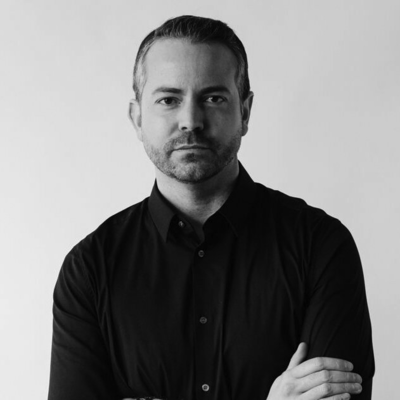
Marc Thorpe
Founder, Marc Thorpe Design
2018 Built Environment Jury Member
MARC THORPE DESIGN WAS FOUNDED IN 2010 BY ARCHITECT AND INDUSTRIAL DESIGNER MARC THORPE. THORPE IS KNOWN INTERNATIONALLY FOR HIS INNOVATIVE AND DYNAMIC WORK, TAKING A RIGOROUS APPROACH TO THE INTEGRATION OF ARCHITECTURE, DESIGN AND TECHNOLOGY. THORPE AND HIS TEAM COLLABORATE WITH CLIENTS TO DEVELOP AND EXECUTE BRAND GROWTH STRATEGIES. THE STUDIO CONCEPTUALIZES DESIGN WHILE BUILDING BRANDS, AND HAS THE RESOURCES TO PRODUCE CONSISTENT COMMUNICATION PLATFORMS, INCLUDE ARCHITECTURE, INTERIOR DESIGN, DIGITAL MEDIA, GRAPHIC DESIGN, FURNITURE DESIGN, PRODUCT DESIGN, RETAIL AND EXHIBIT DESIGN.
THE STUDIO DESIGNS RELATIONSHIPS. THE FOCUS OF MARC THORPE DESIGN IS IN THE SYSTEMIC INTERSECTIONS A PROJECT PRESENTS. IN ORDER TO DISCOVER A PROJECT’S POTENTIAL, THE STUDIO WORKS CLOSELY WITH CLIENTS AND COLLABORATORS TO FOSTER NEW IDEAS, ESTABLISH COMMON VISION AND INNOVATIVE STRATEGIES OF APPROACH TO NURTURE THE DESIGN PROCESS. THE RESULTS ARE DESIGN SOLUTIONS WITH THE HIGHEST DEGREE OF PRECISION, QUALITY AND CHARACTER.
THE STUDIO OFFERS ITSELF AS AN OPEN SYSTEM OF EXCHANGE. THORPE HAS DEDICATED THE STUDIO TO THE RESEARCH, PROFESSIONAL PRACTICE AND EDUCATION OF SYSTEMS THINKING THROUGH THE DISCIPLINE OF ARCHITECTURE AND DESIGN. THORPE STATES, “WE BELIEVE IN A HOLISTIC DESIGN APPROACH, WHICH ENGAGES THE SOCIAL COMPONENTS OF SPACE AND FORM.” COLLABORATIONS WITH DIGITAL ARTISTS, INTERACTIVE DESIGNERS, NEW MEDIA DESIGNERS, SOUND AND LIGHTING ENGINEERS AND SOCIAL MEDIA EXPERTS HAVE ADVANCED THE PRACTICE’S DIVERSITY AND KNOWLEDGE.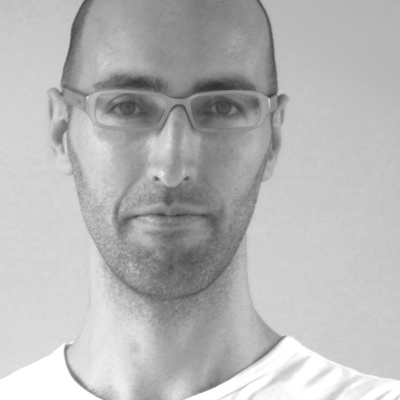
J. Paul Neeley
Director, Neeley Worldwide
2018 Service Design Jury Member
J. Paul is Service Designer & Speculative Designer, and leads Neeley Worldwide where he helps organizations explores the social, cultural, economic, and ethical implications of emerging technologies, designing speculative futures that help engage with possibility as a way of reframing current state opportunities. Recent projects have focused on happiness, healthcare and wellbeing, sleep, self quantification, future mobility, AI, synthetic biology, closed loop fashion, homelessness prevention, and issues of complexity and computational irreducibility in design and business.
J. Paul has worked professionally at Mayo Clinic’s Center for Innovation as Service Designer & Researcher focusing on the healthcare experience and delivery, at Teton Radiology as Service Design Manager realizing innovative medical imaging solutions, and at Unilever in Consumer & Market Insights on brand development.
J. Paul is a tutor on the Service Design course at the Royal College of Art, and has guest lectured at Imperial College: Computer Science, RCA: Design Interactions, NYU: ITP, Köln International School of Design, RISD, and SVA: Design for Social Innovation. J. Paul holds an MA in Design Interactions from the Royal College of Art where he studied with Tony Dunne & Fiona Raby, and is a graduate of Northwestern University where he studied Communications Studies with a concentration in Economics.
Jennifer Kinon
Co-founder, OCD | Original Champions of Design
2018 Visual Communication Jury Captain
Jennifer Kinon co-founded OCD | The Original Champions of Design with Bobby C. Martin Jr. OCD has developed brand identity systems for clients that range from the Girl Scouts of the USA to The New York Times, MTV and the NBA. During 2016, Kinon served as Design Director of Hillary for America. She has spoken about the role of brand identity systems around the world and served as President of AIGA/NY. Kinon graduated from the University of Michigan and earned an MFA from the School of Visual Arts, where she was the first graduate of the program to join its faculty.

Carl Bass
Self-unemployed robot builder and former CEO, Autodesk, Parts & Labor
2018 Open Design Jury Member
Carl Bass serves on the boards of Autodesk, Built Robotics, Formlabs, Planet, Zendesk and Zoox and serves as a special adviser to the CEO of Alphabet. During his 24 year tenure at Autodesk, he held a series of executive positions including president and chief executive officer, chief technology officer and chief operating officer. Bass co-founded Ithaca Software, which was acquired by Autodesk in 1993. Bass also serves on the boards of directors of Zendesk Inc. and Planet; on the board of trustees of the Smithsonian's Cooper-Hewitt National Design Museum, Art Center College of Design, and California College of the Arts; and on the advisory boards of Cornell Computing and Information Science, UC Berkeley School of Information, and UC Berkeley College of Engineering.
He holds a bachelor’s degree in mathematics from Cornell University. Bass spends his time exploring the intersection of art, robotics and machine learning
Gretchen Anderson
Head of Design, PG&E
2018 Commercial Equipment Jury Member
Gretchen spent the first part of her career in design consulting for firms like frog, Cooper, and LUNAR. Currently, she is head of design at PG&E, California’s largest energy company where she’s helping to build the energy company of the future. Previously, she led the design of the hardware and software of a next-generation surgical system and was VP of Product at GreatSchools.org.
Gretchen is a frequent speaker on design topics including the changing role of design in the age of artificial intelligence and bridging physical and digital design. Gretchen has also taught design methods and design thinking in a variety of settings including Stanford and UC Berkeley.
Her past clients include Virgin Records, Samsung, Johnson & Johnson, and Starbucks. Gretchen is a Bay Area native who left only long enough to get a bachelor’s degree from Harvard in History & Literature.
Christopher Specce
Independent Designer & Professor, Rhode Island School of Design
2018 Furniture & Lighting Jury Member
Christopher Specce is a designer and teacher working in Providence, Rhode Island. His practice spans from commercially oriented product design to creating experimental, one a kind of objects. In addition to serving as associate professor in the Department of Furniture Design at Rhode Island School of Design, his professional experiences include projects across the furniture and consumer product industries. Prior to joining the full-time faculty at RISD, he was lead designer at the consultancy Observatory, where he contributed to projects for clients including Herman Miller and P&G.
With a belief that designed objects make an important contribution to culture, he explores the various ways that designers can embed objects with meaning. His studio practice features extensive use of digital design and fabrication tools alongside hands-on work with materials to create works that are at once mundane, delightful, modest, and forthright.
Chi-An De Leo
Creative Director & Co-Founder, Rice Creative
2018 Packaging Jury Captain
Chi-An is a Creative Director and Co-founder of Rice Creative, a Vietnam based brand consultancy. As a true multicultural individual, with an Italian father and French-Vietnamese mother, Chi-An speaks 4 languages and has lived in 5 countries including a major stint of 10 years in the UK. Wanting to get back to his Vietnamese roots, he made the move back to the country where he spent the early years of his childhood. Chi-An worked at Lowe Vietnam and helped them set up the branding department. After a few years in Advertising he felt it was time to make a move back to Branding & Design and co-founded Rice Creative in 2011. Having won multiple international awards with Rice, such as Red Dot, Pentawards, A’Design, Graphis, The Dieline, and Type Directors Club to name a few, Chi-An was invited to take part in the world's most renowned creative awards in London, D&AD. He sat as part of the Branding Jury together with the creative directors of Apple & Moving Brands, judging some of the best work the world had to offer.

Nalini Kotamraju
Vice President of User Research & Analytics, Salesforce
2018 Strategy & Research Jury Member
Nalini P. Kotamraju is Vice President of User Research & Analytics at Salesforce, where she leads a cross-disciplinary team that drives insights for product design and development. She loves using data in all of its forms to create the best product experiences possible. Previously, she led user experience research at Microsoft Dynamics AX, Sun Microsystems Inc., and assorted dot.com companies. Nalini also worked in Denmark and the Netherlands as a professor of technology and society.
Nalini earned her a B.A. in Social Studies and her B.A. in Women’s Studies from Harvard College and a Ph.D. in Sociology from the University of California at Berkeley.
Joe Hebenstreit
CEO, Shaper
2018 Commercial Equipment Jury Captain
Joe Hebenstreit is the CEO of Shaper, a human-involved robotics company focused on dissolving barriers between human intuition and machine tool automation. Shaper’s Origin is a handheld CNC router that employs computer vision and real-time positional motor control to auto-correct for imprecise hand movements and enable entirely new fabrication possibilities. Prior to Shaper, Joe led the Product Design & Engineering team responsible for Glass hardware development at Google X. He began his engineering career in the automotive industry before earning his product development stripes at frog while tackling projects across a wide range of industries including medical devices, wearables, home appliances, industrial equipment and consumer electronics. His reputation for shepherding new technology out of the prototyping lab and into consumer products led him to Amazon’s Lab126 in its earliest days of hardware development. At Amazon, he helped usher enabling technologies like touch interfaces and front-lighting to generations of Kindle e-readers.

Joana Kelly
COO, Small Planet
2018 Interaction Jury Captain
Joana Kelly is the COO at Small Planet, where she helps teams create award-winning mobile products for clients like Disney, NPD Group, and Planned Parenthood.
Her work has earned the Communication Arts Magazine Award of Excellence and the Fast Company Innovation By Design Award, been featured on the App Store and Google Play, and been downloaded millions of times.
Joana has guest lectured at the School of Visual Arts and taught at Parsons The New School for Design. She received her undergraduate degree from New York University and holds an MFA in Design and Technology from Parsons The New School for Design.
Jason Busschaert
Director of Industrial Design, Stanley Black & Decker
2018 Open Design Jury Member
As Director of Industrial Design at Stanley Black and Decker, Jason's role is to provide global leadership in the definition, design, and development of industry leading power tools and outdoor power equipment.
Jason has been a catalyst, integrating new technology to support adjacent design functions all with a goal to optimize the user experience. These efforts further enhance and differentiate the strong brands of Stanley Black and Decker. Prior to working for Stanley Black and Decker, Jason started his career at Canadian Design Consultancy DW Product Development, working with and supporting various clients across a diverse set of markets and industries.
Jason has been recognized with several design awards, most recently receiving a 2015 IDSA IDEA Bronze award for DEWALT’s first entry into Professional Outdoor Equipment.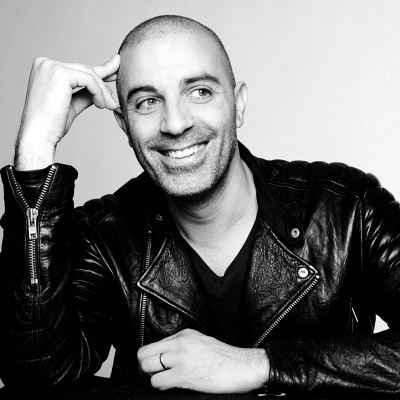
Dror Benshetrit
Principal, Studio Dror
2018 Built Environment Jury Captain
Dror Benshetrit is a designer, thinker, dreamer and futurist. He began his career as an artist and has since amassed an award-winning portfolio of product design, interiors, architecture, master planning and city planning—all before the age of 40. Together with his team of designers, artists, architects, researchers and communicators, he tackles ambitious pursuits to foster authentic connections and improve people’s well-being.
His holistic practice—named one of the most innovative companies in design by Fast Company—intentionally works across all scales, blurring boundaries with each project.
Studio Dror is one of the only practices to bridge Architecture, Design, and Art, and the results are always avant-garde: current endeavors include an innovation lab for the future of nature and humanity, large site-specific installations, a book entitled ‘Dror Dreams’, and The Lookback, an immersive entertainment venture replicating an astronaut’s experience standing on the Moon looking back at Earth.
Collaboration is the cornerstone of his approach: he partners with best-in-class specialists and brands and organizations that share the same spirit of innovation to test the limits of convention and bring profound ideas to life. As a result, Dror’s connections and network includes highly influential people in the worlds of Art, Real Estate Development, Fashion, Design, Academia and Politics.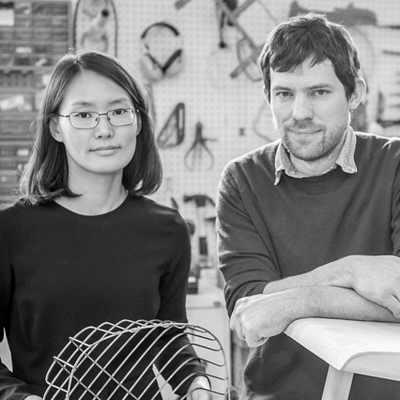
John and Wonhee Arndt
Partners, Studio Gorm
2018 Furniture & Lighting Jury Captain
Studio Gorm was founded in 2007 by John Arndt and Wonhee Jeong Arndt.
As professors in the Product Design department at the University of Oregon, they apply their insightful academic research on culture, history and technology to refocus modern design through the prism of time, exploring the transformation of objects and ideas as they evolve to fit the demands and expectations of modern life.
As designers of functional objects, they draw from their background in sculpture and craft to create works that balance function and aesthetics. Their methods are deeply rooted in the act of physical making where an object’s true form evolves out of an experimental constructive approach to design.